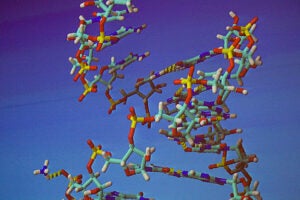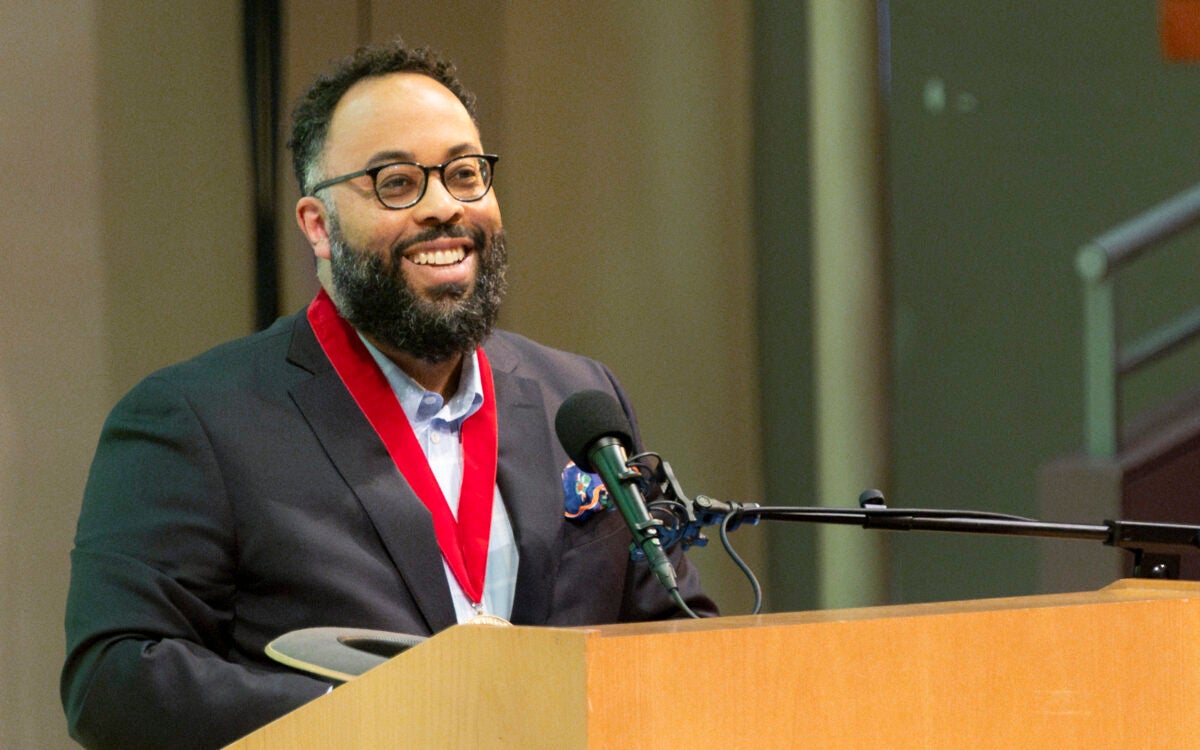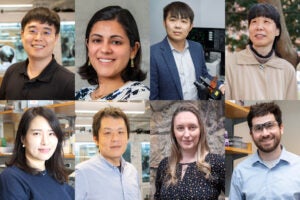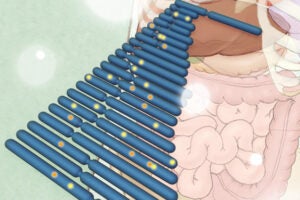Tag: Broad Institute of Harvard and MIT
-
Nation & World
A timely triage test for TB
A team of researchers has developed a point-of-care TB test that costs only $2 and gives results in about 30 minutes, lowering the barrier to care in low-resource settings and potentially saving millions of lives.
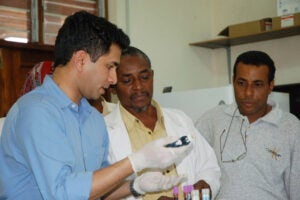
-
Nation & World
Steven Hyman awarded 2016 Sarnat Prize
The National Institute of Mental Health has awarded Professor Steven Hyman ’80 the 2016 Sarnat Prize for his work on treating and understanding psychiatric disorders as biological diseases.

-
Nation & World
Progress against acute myeloid leukemia
A new drug compound developed by researchers at Massachusetts General Hospital and the Harvard Stem Cell Institute to treat acute myeloid leukemia is gentle enough to use with patients too frail to endure chemotherapy.
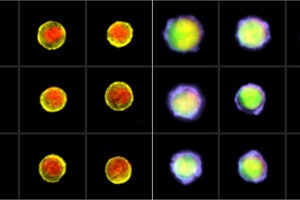
-
Nation & World
Hope against disease targeting children
Harvard Stem Cell Institute researchers studying spinal muscular atrophy have found molecular changes that help trigger the genetic disease in children.
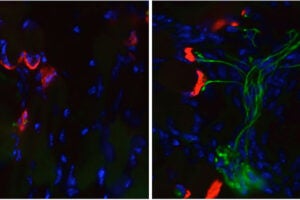
-
Nation & World
The surprising origins of Europeans
Geneticists David Reich and Nick Patterson detailed recent work on human migrations that led to the populations of today’s Europe.
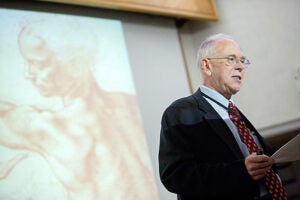
-
Nation & World
$650M gift to Broad seeks to propel psychiatric research
Philanthropist Ted Stanley announced plans to donate $650 million to the Broad Institute of Harvard and MIT to foster research into psychiatric diseases, whose biological causes, long a mystery, scientists have begun to tease out in recent years.

-
Nation & World
Researchers shed new light on schizophrenia
Harvard-affiliated researchers joined an international team to identify more than 100 locations in the human genome associated with the risk of developing schizophrenia in what is the largest genomic study published on any psychiatric disorder to date.
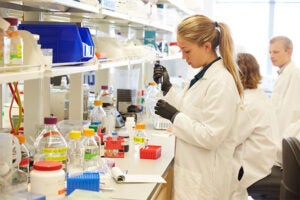
-
Nation & World
Imbalance in microbial population found in Crohn’s patients
A multi-institutional study led by investigators from Massachusetts General Hospital and the Broad Institute of Harvard and MIT reports that newly diagnosed Crohn’s disease patients show increased levels of harmful bacteria and reduced levels of the beneficial bacteria usually found in a healthy gastrointestinal tract.
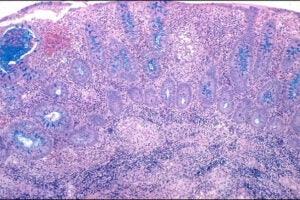
-
Nation & World
Major step in preventing type 2 diabetes
Researchers at the Broad Institute and Massachusetts General Hospital, both Harvard affiliates, have identified mutations in a gene that can reduce the risk of individuals developing type 2 diabetes. If a drug can be developed that mimics the protective effect of these mutations, it could open up new ways of preventing this devastating disease.
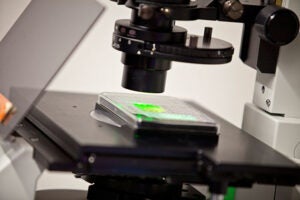
-
Nation & World
Neanderthals’ DNA legacy linked to modern ailments
Remnants of Neanderthal DNA in modern humans are associated with genes affecting type 2 diabetes, Crohn’s disease, lupus, biliary cirrhosis, and smoking behavior. They also concentrate in genes that influence skin and hair characteristics. At the same time, Neanderthal DNA is conspicuously low in regions of the X chromosome and testes-specific genes.

-
Nation & World
Broad launches next decade with $100M gift
American philanthropists and entrepreneurs Eli and Edythe Broad announced on Thursday they are investing an additional $100 million into the Broad Institute of Harvard and MIT to launch a new decade of transformative work to harness recent biomedical discoveries to benefit patients.
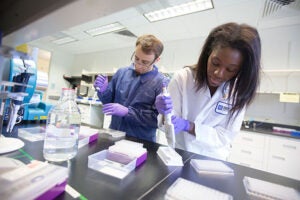
-
Nation & World
Hyman to lead Society for Neuroscience
Steven E. Hyman, former provost and Distinguished Service Professor of Stem Cell and Regenerative Biology at Harvard, has been named president-elect of the Society for Neuroscience, the world’s largest organization of brain and nervous system scientists and physicians.
-
Nation & World
Coelacanth genome surfaces
An international team of researchers has decoded the genome of a creature whose evolutionary history is both enigmatic and illuminating: the African coelacanth

-
Nation & World
Mapping a genetic world beyond genes
Most of the DNA alterations that are tied to disease do not alter protein-coding genes, but rather the “switches” that control them. Characterizing these switches is one of many goals of the Encyclopedia of DNA Elements (ENCODE) project.
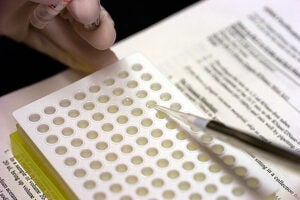
-
Nation & World
CYCLOPS genes an Achilles’ heel in tumors?
Researchers at Harvard-affiliated Dana-Farber Cancer Institute and the Broad Institute of Harvard and MIT used new technology to explore a 19-year-old theory, discovering what may be an Achilles’ heel for cancer cells: essential genes disrupted in the process of becoming cancerous that can be attacked further with drug therapy.
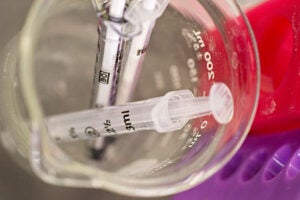
-
Nation & World
When skin cancer cells resist drug treatment
Harvard researchers have found that although tailored drugs can eradicate melanoma cells in the lab, they often produce only partial, temporary responses in patients. Researchers have now learned that normal cells that reside within the tumor, part of the tumor microenvironment, may supply factors that help cancer cells grow and survive despite the presence of…
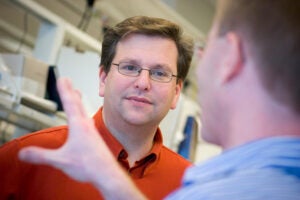
-
Nation & World
Mapping microbes in people
New studies involving Harvard School of Public Health researchers have helped to identify and analyze the vast human “microbiome,” the more than 5 million microbial genes in the body.
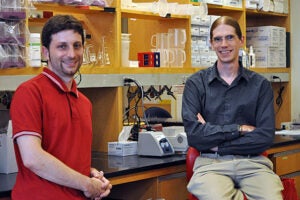
-
Nation & World
Writing the book of cancer knowledge
The Cancer Cell Line Encyclopedia is an academic-industry collaboration resource that marries deeply detailed cancer genome data with predictors of drug response, information that could lead to refinements in cancer clinical trials and future treatments.
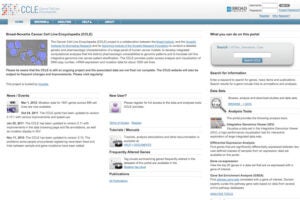
-
Nation & World
Cancer clues from another species
Researchers have decoded the genome of an unlikely ally in the fight against cancer and aging, the naked mole rat, to find clues on why it resists the disease and lives 10 times as long as ordinary mice.

-
Nation & World
Colon cancer connection
Scientists at Harvard-afilliated Dana-Farber Cancer Institute and the Broad Institute have found strikingly high levels of a bacterium in colorectal cancers, a sign that it might contribute to the disease and potentially be a key to diagnosing, preventing, and treating it.
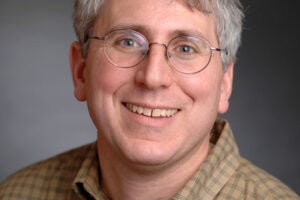
-
Nation & World
Major study on schizophrenia, bipolar
Looking at large samples, an international consortium — that included involvement by scientists at the Broad Institute of Harvard and MIT and Harvard-affiliated Massachusetts General Hospital (MGH) — has identified 10 genetic risk factors that contribute to either schizophrenia or bipolar disorder and discovered strong evidence for three genes being implicated in both diseases.
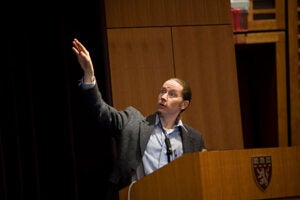
-
Nation & World
Following path of genetic footprint
An international team of researchers studying DNA patterns from modern and archaic humans has found that the Denisovans, a recently discovered hominin group, contributed genes to several populations in Asia and that modern humans settled Asia in more than one migration.
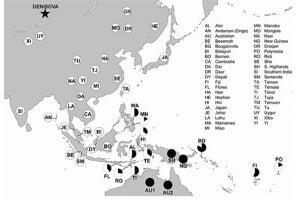
-
Nation & World
Cancer stem cells made, not born
In cancer, tumors aren’t uniform: they are more like complex societies, each with a unique balance of cancer cell types playing different roles. Understanding this “social structure” of tumors is critical for treatment decisions in the clinic because different cell types may be sensitive to different drugs.

-
Nation & World
Finding ovarian cancer’s vulnerabilities
In their largest and most comprehensive effort to date, researchers from the Broad Institute of Harvard and MIT and Dana-Farber Cancer Institute, a Harvard affiliate, examined cells from more than 100 tumors, including 25 ovarian cancer tumors, to unearth the genes upon which cancers depend. They call it Project Achilles.
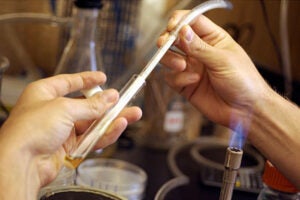
-
Nation & World
What’s behind aggressive breast cancer
Harvard scientists at Dana-Farber Cancer Institute have identified an overactive network of growth-spurring genes that drive stem-like breast cancer cells enriched in triple-negative breast tumors, a typically aggressive cancer that is highly resistant to current therapies.
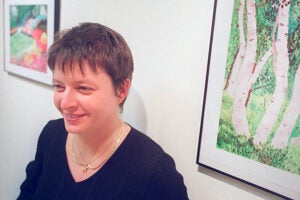
-
Nation & World
Making an art of science
Graduating senior Kevin Shee threw himself into Harvard’s dance scene after arriving as a freshman, but he leaves after nourishing a second love — science — that will take him to a research career after graduation.

-
Nation & World
RNA dynamics deconstructed
RNA plays a critical role in directing the creation of proteins, but there is more to the life of an RNA molecule than simply carrying DNA’s message.
